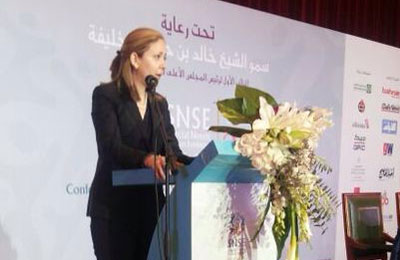
Ourania Dionysiou
Unicef calls for more inclusive world for disabled
Manama, May 13, 2014
Unicef, the United Nations Children’s Fund, has called on all governments to work on placing children with disabilities at the centre of inclusion policies to create more equitable opportunities in education, health and employability.
The call came during the opening session of the 14th edition of the Special Needs Support Exhibition, which took place in Bahrain on May 11 and 12.
Unicef promotes the rights and wellbeing of every child. Together with its partners, it works in 190 countries and territories to translate that commitment into practical action, focusing special effort on reaching the most vulnerable and excluded children.
Across the world, progress has been made to realise the rights of children with disabilities. Yet many girls and boys still face challenges in accessing the everyday services that they need to flourish, said a statement.
“In Unicef we share the conviction that all children around the world have the same rights and the same needs to attain the potential to lead fulfilling lives and to contribute to the social, cultural and economic vitality of their communities,” said Ourania Dionysiou, Unicef advisor on partner relations, Gulf Area Office.
She also highlighted the 2013 edition of Unicef’s annual report State of the World’s Children, which examined the situation of children with disabilities around the world and laid out the recommendations for what needs to be done to ensure effective inclusion that reaches every child.
“What our study revealed is that, in spite of our best efforts, there is still not enough information about children with disabilities or what they need. This means that people don’t always think about these children. And in practical terms this can cause a number of physical barriers that stand in their way,” Dionysiou said.
By their commitment to upholding the Convention on the Rights of the Child (CRC) and the Convention on the Rights of Persons with Disabilities (CRPD), governments around the world have taken upon themselves the responsibility of ensuring that all children, irrespective of ability or disability, enjoy their rights without discrimination of any kind, said the statement.
The conventions bear witness to a growing global movement dedicated to the inclusion of children with disabilities in community life. They establish that children with disabilities have the same rights as others. Unicef recommends that governments align their policies and programmes with these conventions and that all stakeholders, including families, civil society and the corporate sector, are involved in providing support to the efforts for inclusion.
When it comes to children with disabilities, Bahrain has made significant progress. Not only has the country ratified the Convention on the Rights of Persons with Disabilities, but it has also been among the first in the region to develop a national strategy for persons with disability in a participatory process that involved all the stakeholders especially persons with disability themselves, it said.
In 2012, Bahrain launched an inclusive education campaign and established a Higher Committee for Disabled Affairs, which includes representatives of concerned civil society organizations. A plan of actions that will conclude in 2016 has also been developed, it added.
“We applaud these great steps that put Bahrain on the path to ensuring every child has access to their rights and we hope more governments and partners will follow these valuable examples,” added Dionysiou. - TradeArabia News Service







